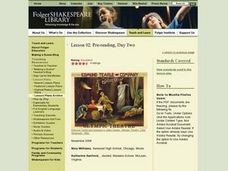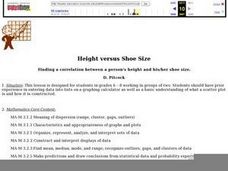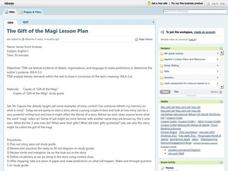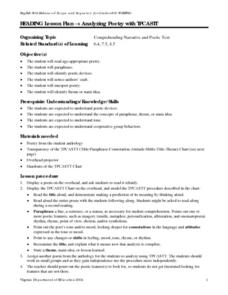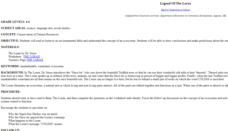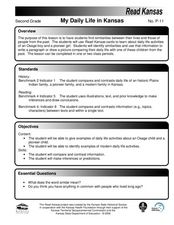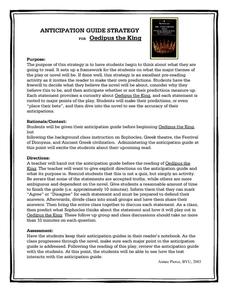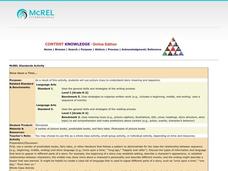Curated OER
Recognizing Litter
When does trash become litter? Use this litter awareness lesson to help them understand the importance of trash disposal. Get learners engaged by reading Nancy Loewen's Lady Lulu Liked to Litter (not included). After discussing what...
Curated OER
Reintroduce: Main Idea
What would a main idea be without important details? Readers use a graphic organizer to record key details from an informational text (a fiction text would also work). Review main idea as a concept before beginning, asking scholars to...
Curated OER
Shakespeare: Julius Caesar
Before your high schoolers read Julius Caesar, have them complete this thought-provoking activity! To familiarize them with some of the play's most important lines, break the class into pairs and have them create a skit around two lines...
Curated OER
Height versus Shoe Size
Students find a correlation between a person's height and his/her shoe size. They have access to entering data into lists on a graphing calculator and can complete scatter plots. Students read and interpret a scatter plot and use the...
Curated OER
The Gift of the Magi
Test the true meaning of giving - and irony - with this lesson about "The Gift of the Magi." Using textual analysis, details, and text organization, middle schoolers make predictions about future events in the story and determine the...
Curated OER
Analyzing Poetry with TPCASTT
Middle schoolers read a poem and complete a TPCASTT chart. They make a prediction about the title (T) , paraphrase each line (P), identify poetic devices and nuances (C-connotation), explore mood and tone (A-attitude), point out shifts...
Curated OER
Whale Is Stuck
Students engage in the process of problem solving with the help of children's literature story of how the whale was trapped and then freed. The story illustrates the power of teamwork and commitment. The students practice the skill of...
Curated OER
The Metamorphosis by Franz Kafka
Students, after reading and discussing, "The Metamorphosis," by Franz Kafka, explain the symbolism of Gregor's metamorphosis moving beyond a literal view of "he turned into a bug" into the idea that society/family/stress/environment led...
Curated OER
Legend of The Lorax
Young scholars explore ecosystems. They read or listen to Dr. Seuss' The Lorax to draw conclusions and make predictions about the environmental impact and use of resources. They write poems about real forests and the wildlife which...
Curated OER
Lesson Plan on the Edmund Fitzgerald
Fourth graders describe the weather conditions and location of the Edmund Fitzgerald when it sank in Lake Superior.
Curated OER
The Sound Monster - Words That Make Sounds
Students watch as the teacher makes sounds with her hands. They think of a word to describe the sound. Students discuss the way the word sounds like the sound. They complete the "The Sound Monster Activity." Students are told that...
Curated OER
Testing a Hypothesis
In this hypothesis instructional activity, students learn about the scientific method, particularly how to test a hypothesis by creating an experiment. Students complete 4 short answer questions.
Curated OER
Guided Reading with Two Sweet Peas
Second graders read the book, Two Sweet Peas. Working in guided reading groups, they discuss moving, making friends, and the differences between poems and stories. They read the book silently and discuss the importance of being kind and...
Curated OER
English Literature Circle Discussion
Students participate in literary circles to analyze characters, critique writing, discuss events, and story elements. In this literary circles lesson plan, students take responsibility for their learning as a member of the group. ...
Curated OER
My Daily Life in Kansas
Second graders use 'Read Kansas' cards to learn about the daily life activities of an Osage boy and a pioneer girl. In this similarities and differences lesson, 2nd graders write a paragraph and draw a picture comparing their daily life...
Curated OER
Read Aloud Lesson Plan: Water for One, Water for Everyone
Students listen to a read aloud about African animals as they access a watering hole. They discuss the characteristics of Africa such as the temperature, it distance from the students, and lifestyle of the animals. They talk about how...
Curated OER
Hattie and the Fox
Who is Hattie? Youngsters explore animal characteristics by reading poems and stories in class. They read the book Hattie and the Fox about a fictitious fox and his drama with the other farm animals. Then they reread the story over...
Curated OER
Magazine Madness
Young scholars look at pictures cut out of magazines to determine what is happening in the picture and predict what will happen next.
Curated OER
Health and Physical Education
Second graders read the story, Just a Minute. They create books with physical activities listed. They predict how many times they can perform that activity in one minute.
Curated OER
Story of a Bluebird
First graders build comprehension skills. In this reading comprehension activity, 1st graders activate prior knowledge and create text to self connection in preparation for reading. Students read Story of a Bluebird and complete a...
Curated OER
Circle of Gold Guided Reading
Students participate in a variety of Guided Reading activities including comprehension questions, discussion, prediction, characterization and inferring meaning while they read Circle of Gold by Candy Dawson Boyd.
Curated OER
Tooling Around Arizona: Reading Arizona Maps
Students research Arizona maps. In this map lesson, students discuss map titles, scales, directions, elevation, and symbols. The class will examine topography, landforms, and rivers found on an Arizona map.
Novelinks
Oedipus the King: Anticipation Guide
Is it possible to escape fate? Are all types of pride evil? Are family secrets best kept secret? Before reading Oedipus the King, class members respond to a series of statements on an anticipation guide that introduces some of the basic...
Curated OER
Once Upon a Time...
Model for emergent readers how to write a story by interpreting picture clues. For guided practice a second book is used, and then pupils work independently or with an adult to write their own stories based on illustrations.




